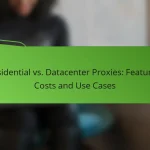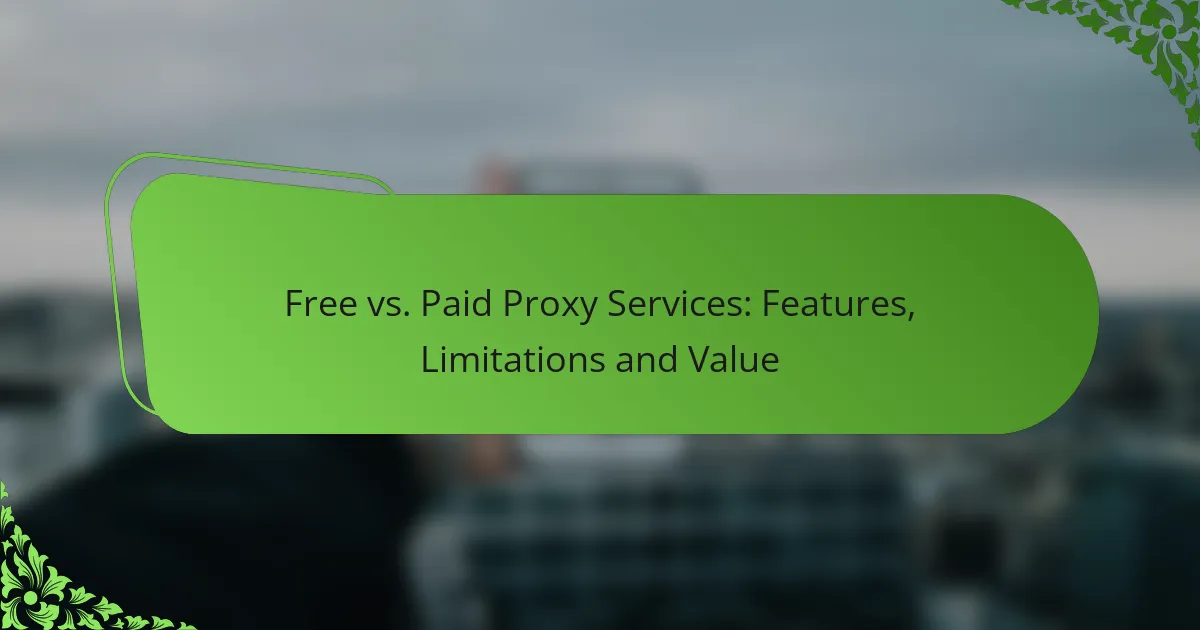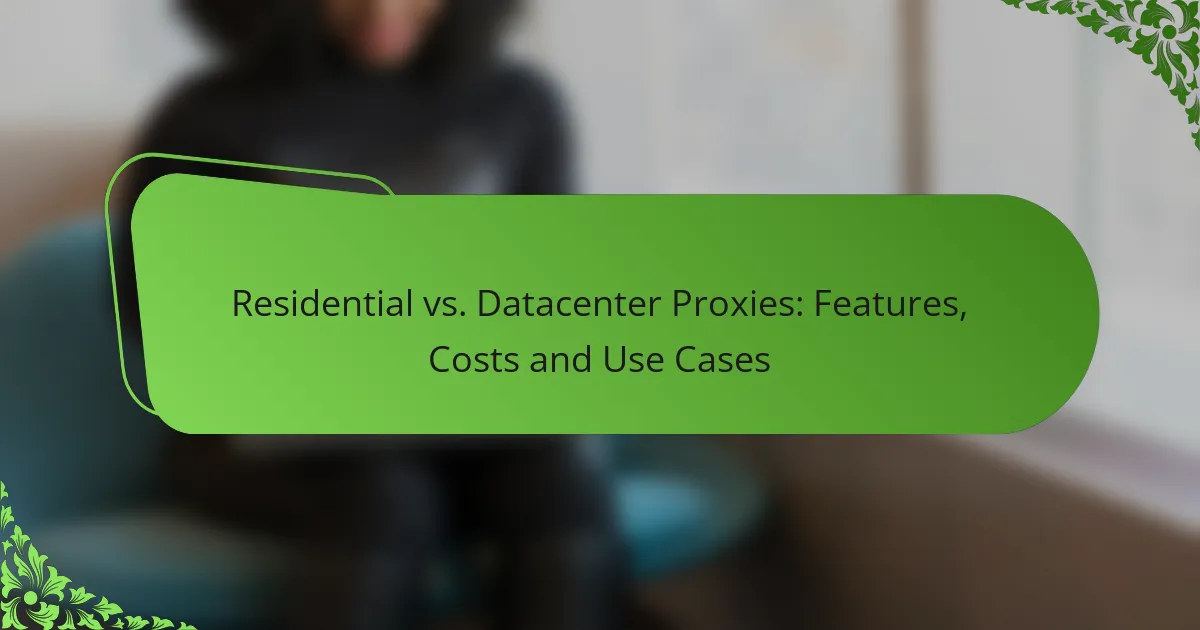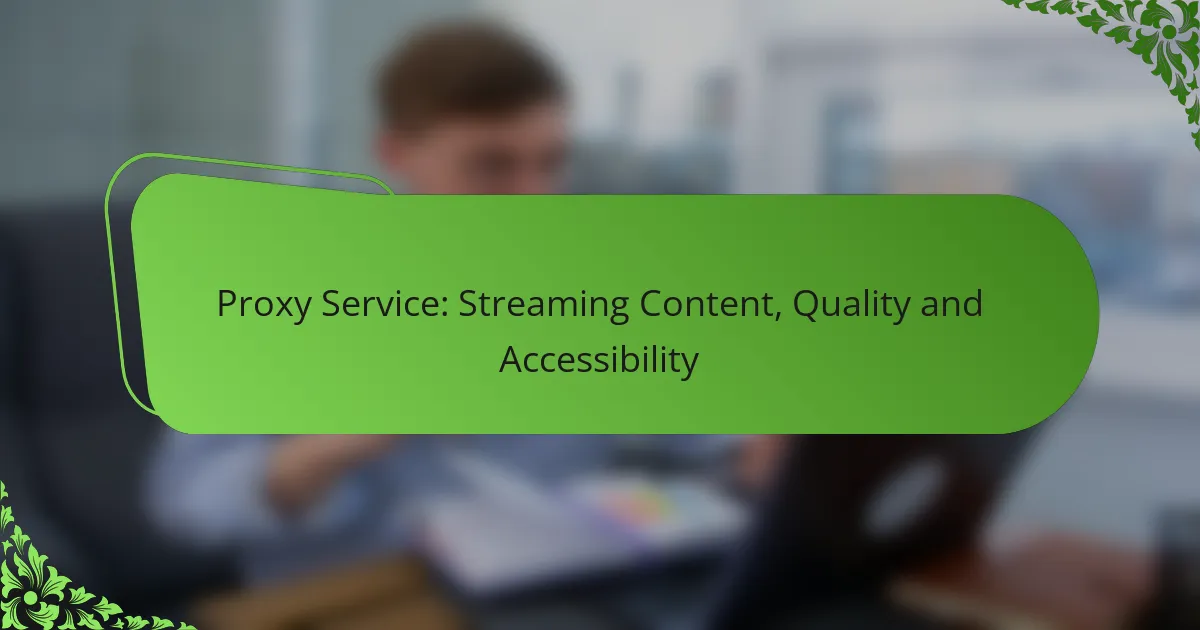When choosing between free and paid proxy services, it’s essential to understand their distinct features and limitations. Paid proxies typically provide enhanced privacy, security, and performance, making them ideal for users with serious online needs. In contrast, free proxies may seem appealing but often come with significant drawbacks, such as slower speeds, unreliable connections, and potential data privacy risks.
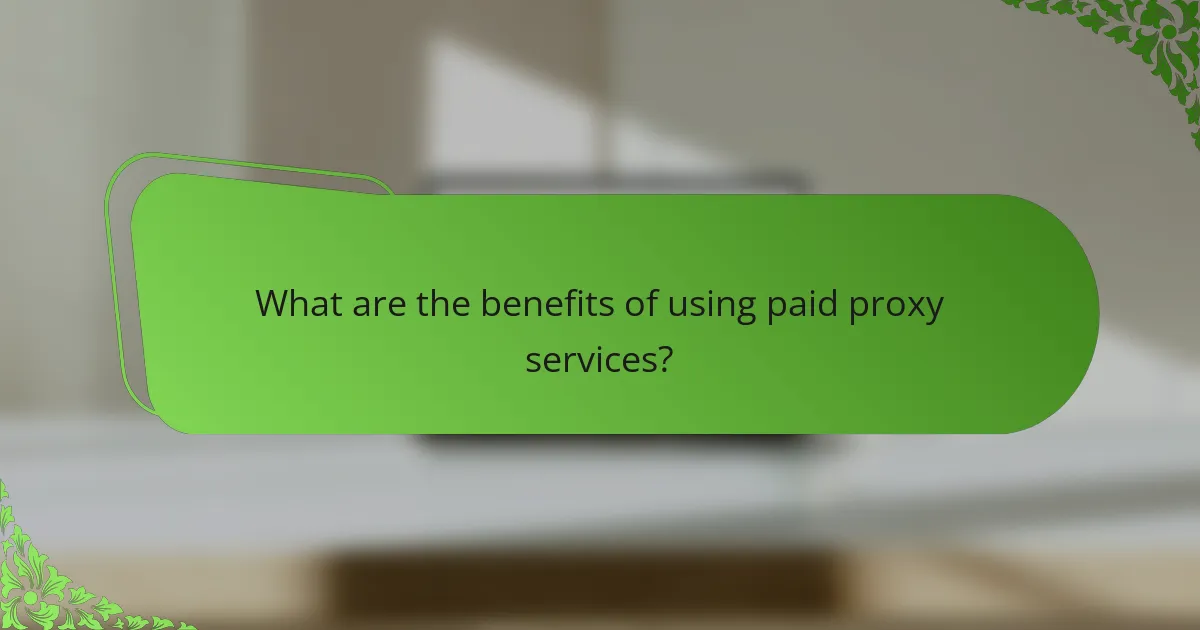
What are the benefits of using paid proxy services?
Paid proxy services offer enhanced features that significantly improve online privacy, security, and performance compared to free options. Users can expect better reliability, faster speeds, and dedicated support, making them a worthwhile investment for serious internet users.
Enhanced security features
Paid proxy services typically include advanced security measures such as encryption, which protects your data from potential threats. This is crucial for users handling sensitive information, as it reduces the risk of data breaches and cyber attacks.
Many paid services also offer features like IP masking and anonymous browsing, ensuring that your online activities remain private. This level of security is often not available with free proxies, which may expose users to various risks.
Higher speed and reliability
Paid proxy services generally provide faster connection speeds and more stable performance compared to free alternatives. Users can expect lower latency and quicker load times, which is essential for activities like streaming or online gaming.
Moreover, paid services often have a larger pool of servers, allowing users to choose locations that optimize their connection. This flexibility helps maintain a consistent and reliable internet experience.
Access to premium IP addresses
With paid proxy services, users gain access to a wide range of premium IP addresses that are less likely to be blacklisted. This is particularly beneficial for businesses and individuals who need to perform web scraping or access geo-restricted content.
Having a diverse selection of IP addresses also helps in avoiding detection and bans, which can be common with free proxies that share IPs among many users. This ensures a smoother and more effective browsing experience.
Better customer support
Paid proxy services typically offer superior customer support, including 24/7 assistance via multiple channels such as chat, email, or phone. This is crucial for resolving issues quickly and efficiently, minimizing downtime.
In contrast, free proxy services often lack dedicated support, leaving users to troubleshoot problems on their own. Investing in a paid service means you can rely on expert help when needed, enhancing your overall experience.
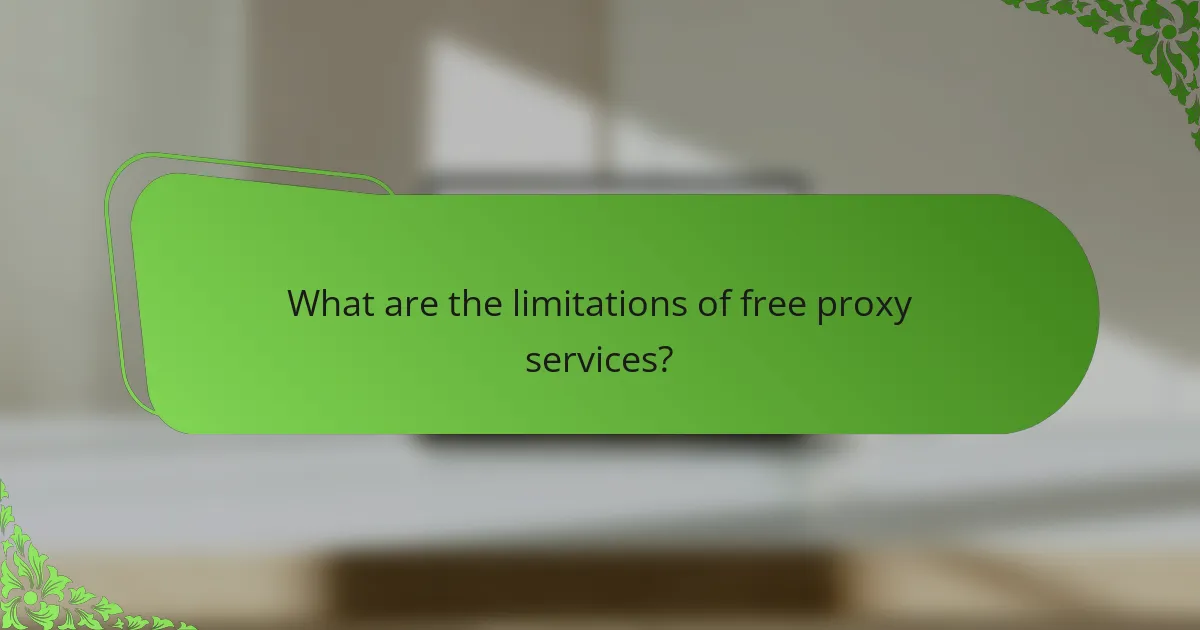
What are the limitations of free proxy services?
Free proxy services often come with significant limitations that can impact user experience and security. These drawbacks include data privacy issues, restricted bandwidth and speed, inconsistent uptime, and limited access to certain websites.
Data privacy concerns
Using free proxy services can expose users to serious data privacy risks. Many free proxies log user activity and may sell this data to third parties, compromising personal information and browsing habits.
Additionally, free proxies may lack encryption, making it easier for malicious actors to intercept sensitive information. Users should be cautious and consider the potential risks to their privacy when opting for free services.
Limited bandwidth and speed
Free proxy services typically offer limited bandwidth and slower speeds compared to paid options. Users may experience buffering or lag, especially during peak usage times when many individuals are connected to the same server.
This can hinder activities like streaming or downloading large files, making free proxies less suitable for high-demand tasks. Users should assess their needs and consider whether the trade-off in performance is acceptable.
Inconsistent uptime
Uptime is often a significant issue with free proxy services, as they may not guarantee reliable access. Users can encounter frequent disconnections or downtime, which disrupts browsing and online activities.
Inconsistent uptime can be frustrating, particularly for users who rely on proxies for work or critical tasks. It’s advisable to test the reliability of a free proxy before committing to its use.
Restricted access to certain websites
Many free proxy services restrict access to certain websites, often due to licensing agreements or content filtering. Users may find that popular streaming services or social media platforms are blocked when using a free proxy.
This limitation can severely impact the usability of the proxy for those seeking to bypass geographic restrictions. Users should verify whether a free proxy can access the sites they need before relying on it for their browsing needs.
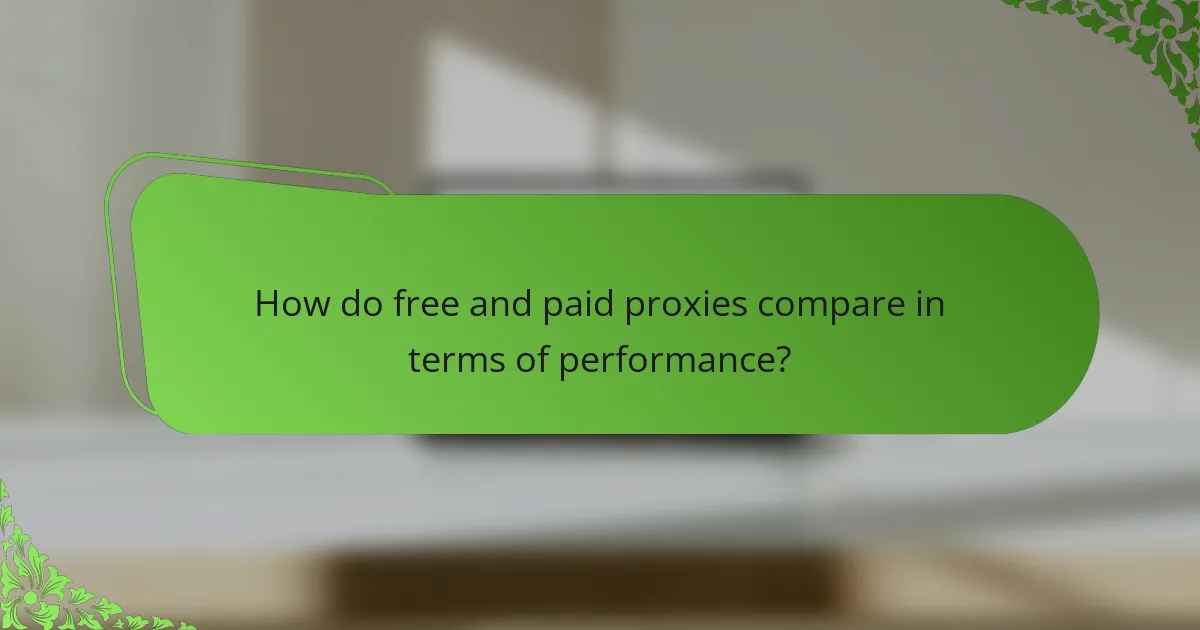
How do free and paid proxies compare in terms of performance?
Free and paid proxies differ significantly in performance, with paid options generally offering superior speed, stability, and reliability. Users should consider their specific needs, as free proxies may suffice for casual browsing but often fall short for demanding tasks.
Speed differences
Paid proxy services typically provide faster speeds compared to free proxies. This is due to better infrastructure, dedicated bandwidth, and fewer users sharing the same resources. For instance, while free proxies might offer speeds in the range of a few hundred kbps, paid services can deliver speeds exceeding several Mbps.
When selecting a proxy, consider your intended use. If you plan to stream videos or download large files, opting for a paid proxy can significantly enhance your experience.
Connection stability
Connection stability is often a major advantage of paid proxies. Free proxies can be unreliable, frequently dropping connections or experiencing interruptions due to high user traffic. In contrast, paid services invest in robust server networks, ensuring more consistent uptime and fewer disruptions.
For critical tasks, such as online gaming or business communications, a stable connection is essential. Choosing a paid proxy can help mitigate the risk of unexpected disconnections.
Latency issues
Latency, or the delay before data transfer begins, is generally lower with paid proxies. Free proxies may introduce higher latency due to overcrowding and limited server resources, leading to slower response times. Paid options, however, often maintain lower latency levels, typically in the low tens of milliseconds.
To minimize latency, look for paid proxies that offer servers closer to your geographical location. This can enhance performance, especially for real-time applications like video conferencing or online gaming.
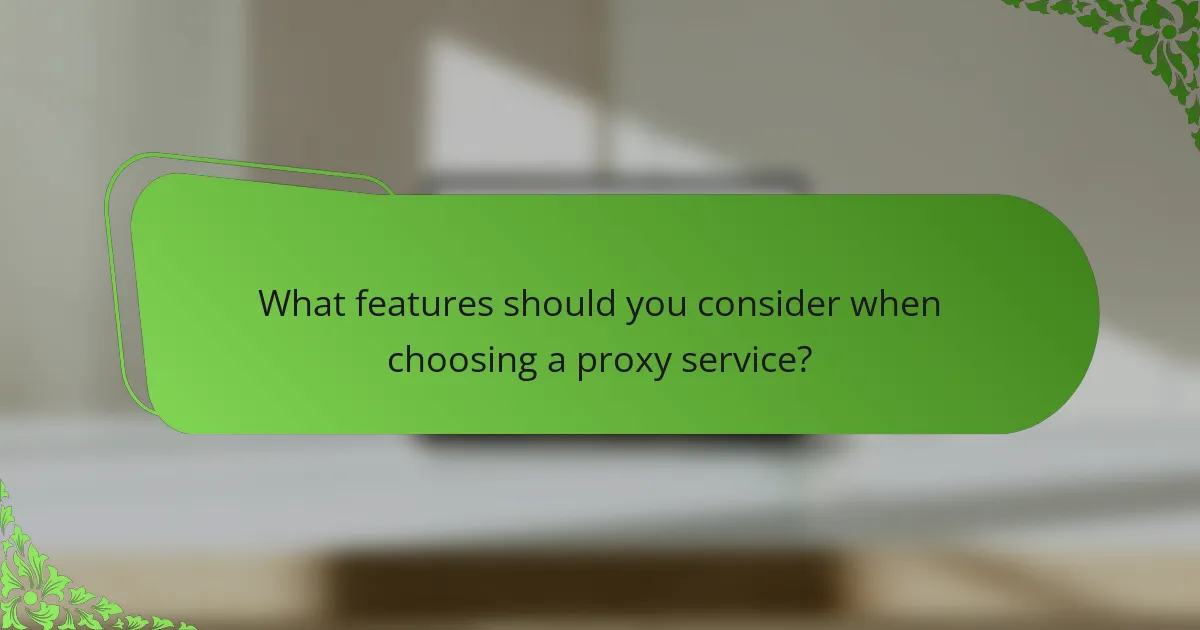
What features should you consider when choosing a proxy service?
When selecting a proxy service, consider features such as security protocols, geographic coverage, and pricing models. These elements significantly influence the effectiveness, reliability, and cost of the service you choose.
Security protocols
Security protocols are essential for protecting your data while using a proxy service. Look for services that offer strong encryption methods, such as HTTPS or SOCKS5, which help safeguard your information from potential threats.
Additionally, consider whether the proxy service has a no-logs policy, meaning it does not store any information about your browsing activity. This is crucial for maintaining your privacy and anonymity online.
Geographic coverage
Geographic coverage refers to the number and location of servers offered by the proxy service. A broader range of locations allows you to access content that may be restricted in your area, enhancing your browsing experience.
When evaluating geographic coverage, check if the service provides servers in regions relevant to your needs, such as the US, EU, or Asia. This can be particularly important for activities like streaming or accessing region-specific websites.
Pricing models
Pricing models for proxy services can vary widely, with options ranging from free to subscription-based plans. Free proxies may seem appealing but often come with limitations such as slower speeds, fewer security features, and potential data risks.
Paid services typically offer better performance, enhanced security, and dedicated customer support. When comparing pricing, consider the features included in each plan and whether they align with your specific requirements, such as bandwidth limits or the number of simultaneous connections.

How do pricing structures differ between free and paid proxies?
Pricing structures for free and paid proxies vary significantly, primarily in terms of reliability, speed, and security. Free proxies often come with limitations that can hinder performance, while paid services typically offer enhanced features and support for a subscription fee.
Cost analysis of paid services
Paid proxy services usually charge a monthly or annual fee, which can range from a few dollars to several hundred, depending on the features offered. Common pricing models include tiered plans based on bandwidth usage, number of simultaneous connections, or geographic coverage.
Investing in a paid proxy can provide benefits such as faster speeds, better uptime, and customer support. Businesses often find that the return on investment justifies the cost, especially when considering the potential for increased productivity and security.
Hidden costs of free proxies
While free proxies may seem appealing, they often come with hidden costs that can outweigh the initial savings. Users may encounter slow speeds, frequent downtime, and limited bandwidth, which can disrupt online activities.
Additionally, free proxies may compromise user privacy by logging data or injecting ads. Users should be cautious and consider the potential risks to their personal information, which can lead to further expenses in terms of security breaches or data loss.
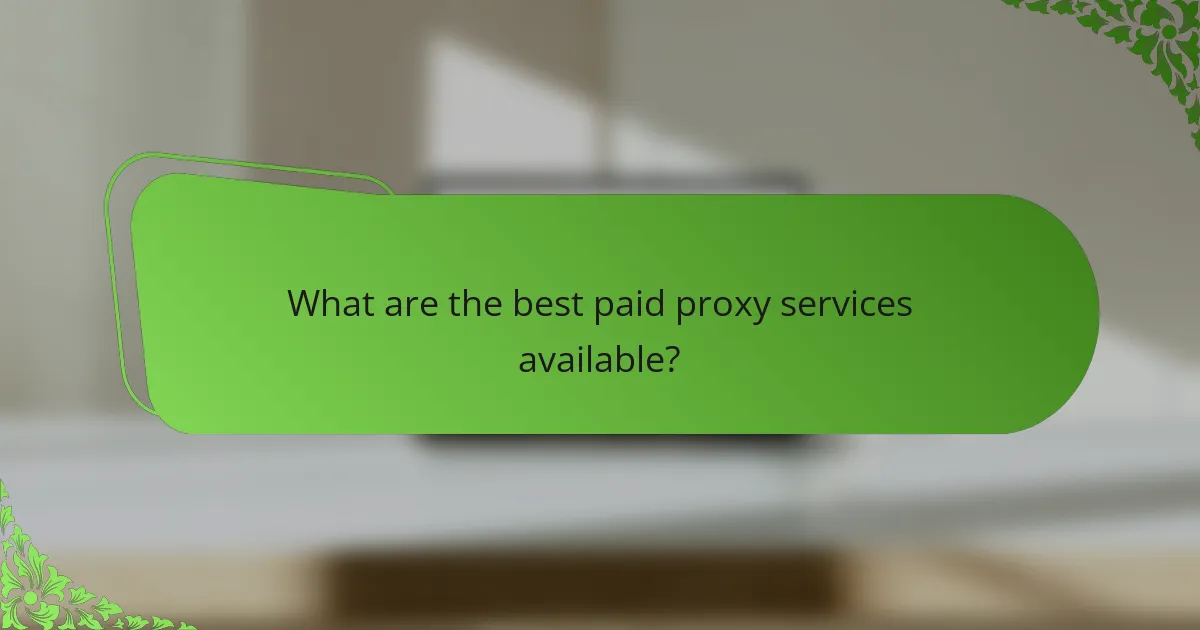
What are the best paid proxy services available?
The best paid proxy services offer enhanced security, faster speeds, and reliable performance compared to free options. Popular choices include providers like NordVPN, Smartproxy, and Bright Data, each catering to different needs such as web scraping, anonymity, or bypassing geo-restrictions.
Features of Paid Proxy Services
Paid proxy services typically include features like dedicated IP addresses, higher bandwidth limits, and advanced encryption protocols. These features ensure better privacy, faster connections, and more stable performance, making them suitable for business and personal use.
Many paid services also offer user-friendly dashboards for managing proxies, extensive customer support, and a variety of server locations worldwide. This flexibility allows users to choose the best proxy for their specific needs, whether for streaming, browsing, or data collection.
Limitations of Paid Proxy Services
While paid proxy services provide numerous benefits, they can also have limitations, such as subscription costs that may range from a few dollars to over a hundred per month, depending on the provider and plan. Users must weigh these costs against their requirements and budget.
Additionally, some paid proxies may have restrictions on usage, such as limits on simultaneous connections or data usage. It’s essential to review the terms of service to avoid unexpected limitations that could impact your online activities.
Value of Paid Proxy Services
The value of paid proxy services lies in their ability to provide reliable and secure internet access. For businesses, the investment often pays off through improved data collection and market analysis capabilities, while individuals benefit from enhanced privacy and access to restricted content.
When considering value, assess factors like speed, reliability, and customer support. A well-reviewed service with a money-back guarantee can provide peace of mind, ensuring that you can test the service without long-term commitment.
